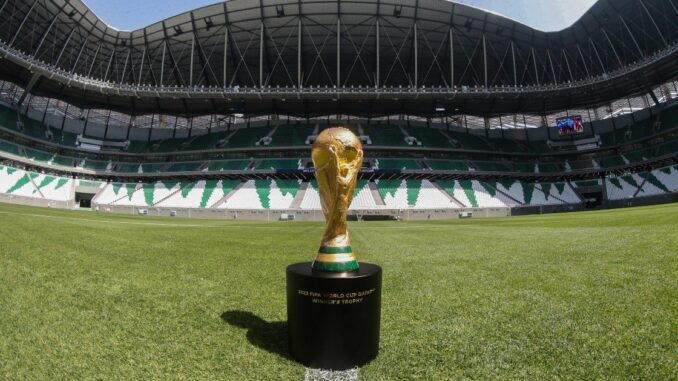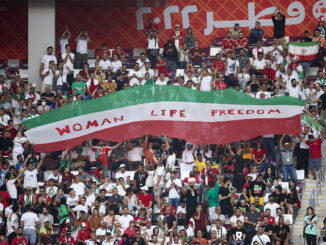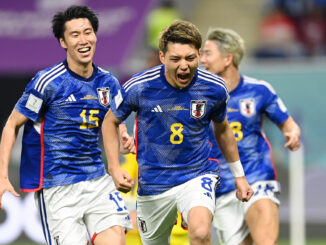
After the full throttle pinball fury that was Round 2’s culmination in June, a semblance of normality returns to Asian football this September as the traditional home/away format of Round 3 FIFA World Cup qualification enters the final stretch en route to Qatar in little over a year’s time.
The final round, as it tends to be promoted lately, is starting to self-generate its own prestige, an oddity for a continent that rarely has any sort of consistent format to really build tradition upon. The heavyweight showpiece, with arguably the most competitive play in the Asian calendar, the past few editions have put the continent’s play on a mantle that has truly pushed its standards in quality and drama.
The format remains unchanged from the Road to Russia four years ago; twelve teams spread between two groups, the top two in each qualify for the World Cup directly, while the two third-placed teams meet to decide who competes in the intercontinental playoff next June.
This will be the last time such selective elimination will take stage. With expansion promised for 2026, 2022 will be the final exclusive trim of elite Asian football we’re likely to see. Many are expecting (or at least hoping) this campaign will be a collectors item.
The added complexities of COVID-19, that decimated the previous round’s play, remain a decisive factor; multiple teams will play “home” games in neutral venues, those lucky enough to play on home soil could do so without fans, while all nations face an anguished wait every given month to see if they can call up their desired squad, with a myriad of quarantine and travel restrictions likely to remain in place for the foreseeable future.
That being said, we enter this stage in predictable form; the big four (with an arguable fifth wheel for company) in Japan, Iran, South Korea and Australia (joined lastly by Saudi Arabia) are not merely content in challenging for 2022 qualification but expecting it.
While the elite remain unchallenged in rankings terms, there are mitigating circumstances against each and every one of them, opening the door ajar for a more unfancied options from outside the usual.
In Group A, UAE are primed to make the best case to upset Iran and Korea in challenging for one of the top three spots, if not the top two. It feels like all-too-familiar ground for their coach Bert van Marwijk, a man who masterminded a similar feat for Saudi Arabia last cycle by climbing above Australia for a direct spot to Russia, his pedigree for this moment can’t be underestimated.
In many ways, the Dutchman’s presence on the Emirati bench, as a pragmatic, risk-averse coach fits neatly alongside one of the strongest attacking squads in Asia.
Legendary striker Ali Mabkhout’s form remains strong as he heads into his 30’s, but he has much to thank to his new supporting cast of the recently naturalised Brazilian-born duo of Caio Canedo and Fabio Lima; both of whom burst onto the international stage at the start of the northern summer as key catalysts to UAE’s eventual progression.
In one of the toughest initial groups on paper, UAE rose above the tightly packed competition behind them to win four games from four in June, scoring an emphatic 15 over the two weeks, against the likes of Vietnam and Thailand who they had previously stumbled against.
The implementation of a new found belief regularly saw them start off on the front foot, opting against the pedestrian old possession first mentality, to a dynamic and direct game that made the most of their expanded armoury.
It would damage many an Asian football fan’s heart to think that UAE could qualify for a World Cup as soon as their golden generation finally exited, but as the likes of Ahmed Khalil and Omar Abdulrahnan look on, van Marwijk may well provide the twist in the Emirati football play book.
The caveat, alongside the undisputed talents and experience of their competitors, is the question mark lying against their form on the road. UAE’s below par start to Round 2 had much to do with two frustrating away results (not to mention a fortuitous victory in Malaysia), while in the last round of the Road to 2018, capitulation in Thailand and Australia proved their undoing; their home comforts have indeed helped them flatter to deceive.
A favourable fixture list, including three of their first four at home (the fourth in neutral territory against Syria in Jordan), means we’ll have to wait until November to see if they’re able to reverse their away woes; by which point we could already see the Dubai-built challenge bear fruit.
Listen to our preview of Group A of Asian Qualifiers as Wael Jabir joins us to preview all six teams.
Elsewhere in the group, a tale of three teams with three new coaches, as Syria, now coached by Nizar Mahrous, Iraq under legendary coach Dick Advocaat and Lebanon with Ivan Hasek, offer three talented but predictably unpredictable outfits that have chanced their hand mere weeks out from the start of Round 3.
While Group A promises some tricky contests, on paper Group B feels lopsided, split between the likely lads of Japan, Australia and Saudi Arabia, and the motley crew of unique wonders that is China, Oman and Vietnam. If anything this group couldn’t be criticised for lacking variety.
From the solidity and effective setup of Branko Ivankovic’s Oman, who may lack goals but are building a semblance of play, to the counter attack dynamism of Park Hang-seo’s Vietnam, a side slipping under the radar following a slow burning initial stage; threat remains from all corners, but consistency or the strength in mentality to step up to the next level remains in question.
An area which China, of all teams challenging the established order in Group B, shouldn’t have a problems.
Previous World Cup qualifiers, and regular continental title challengers from the last 30 years, the circus of the recent decade in Chinese football seems to have finally dampened any ludicrous ideas of grandeur, with expectations seemingly at an all time low heading into September.
The realistic yet brutal rhetoric from national team coach Li Tie ahead of their ominous double header against Australia and Japan next week has almost felt refreshing given what has come before; speaking of his players “unconfidence” in acquiring victories at this level, his watered down precursor to another ill-fated campaign is a new strategic approach it must be said.
It has been a brutal few years for Chinese football; contrasting to the big money days of yesteryear, the investment into playing staff has dried up, quickly seeing the CSL wilt in its international prestige.
The pandemic’s impact on its origin state hasn’t helped sport in the slightest; delayed domestic competition, sending youth teams to the Champions League, all before a botched hope of hosting World Cup qualification has left China weary and on the ropes.
For all the negatives, one of their varied approaches to improving the national side has finally started delivering results, that of nationalisation.
From a tenuous position in Round 2 pre-June, the impact of more Brazilian born attackers, this time Elkeson and Alan, turned around a stale campaign to finish with four victories on the bounce, which on the face of it should be expected but given the starting point should be commended.
While China in their current state look set to steal a march on the top three, the potential for an upset or two can quickly change proceedings in this final stage. Margins at this level are often minute, and with off the field matters playing havoc more regularly than usual, a sprinkling of imported attacking magic may be the desired formula for yet more unpredictability.
As Syria demonstrated to near perfection four years ago, the forthcoming culmination of a stop/start qualification cycle promises to have left the very best until last.
Photo: Supreme Committee for Delivery & Legacy
Listen to our preview of Group B of Asian Qualifiers as Gabe Tan joins us to preview all six teams.




